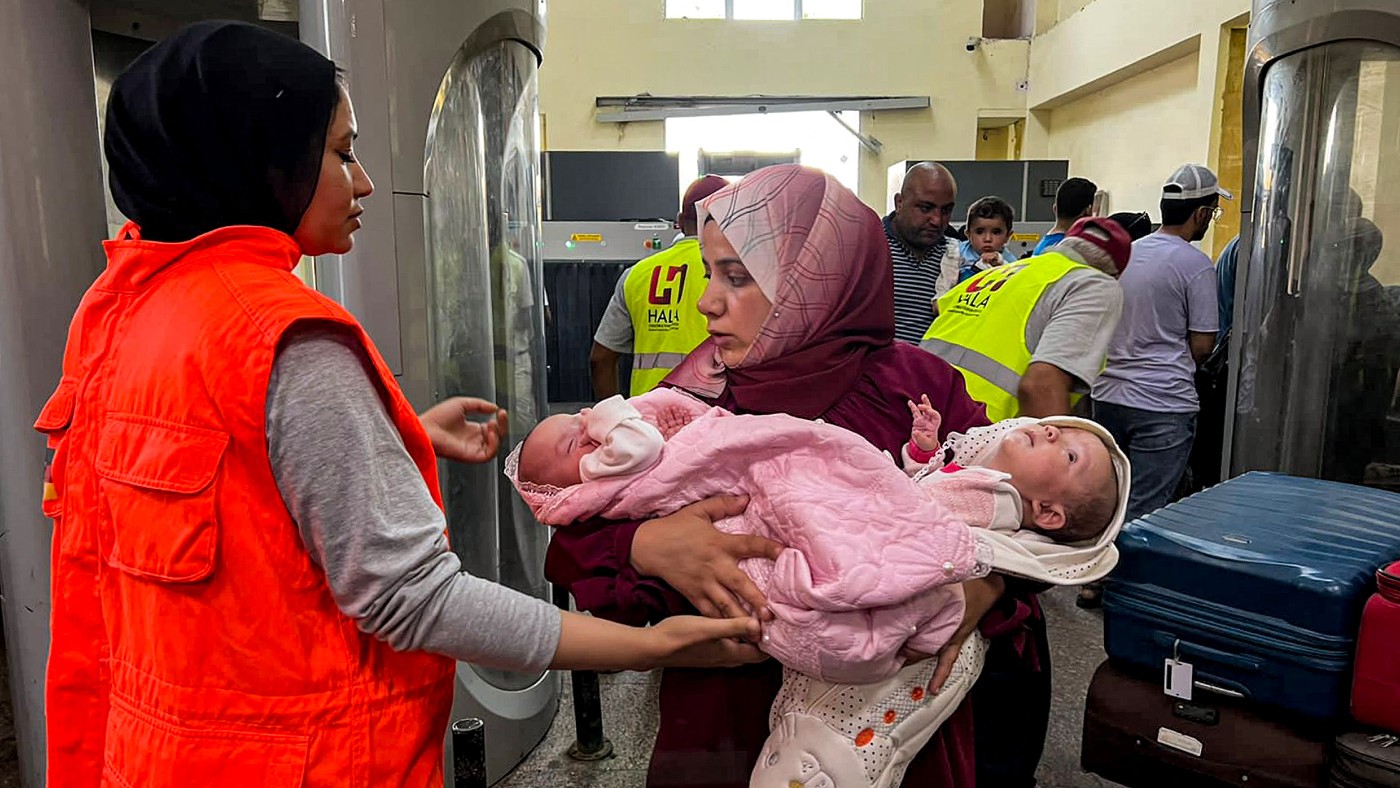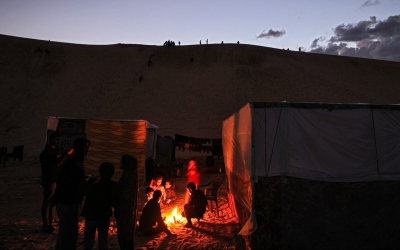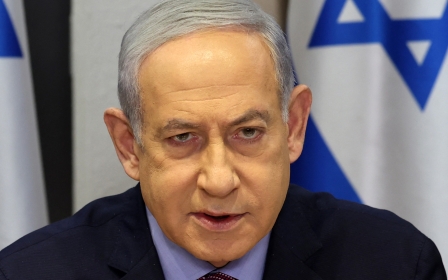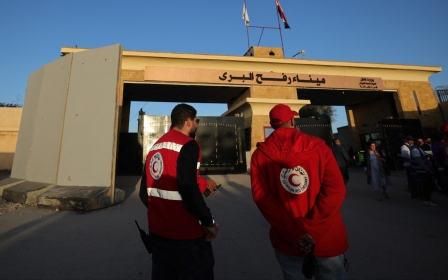War on Gaza: Palestinians paying mediators thousands of dollars to escape into Egypt
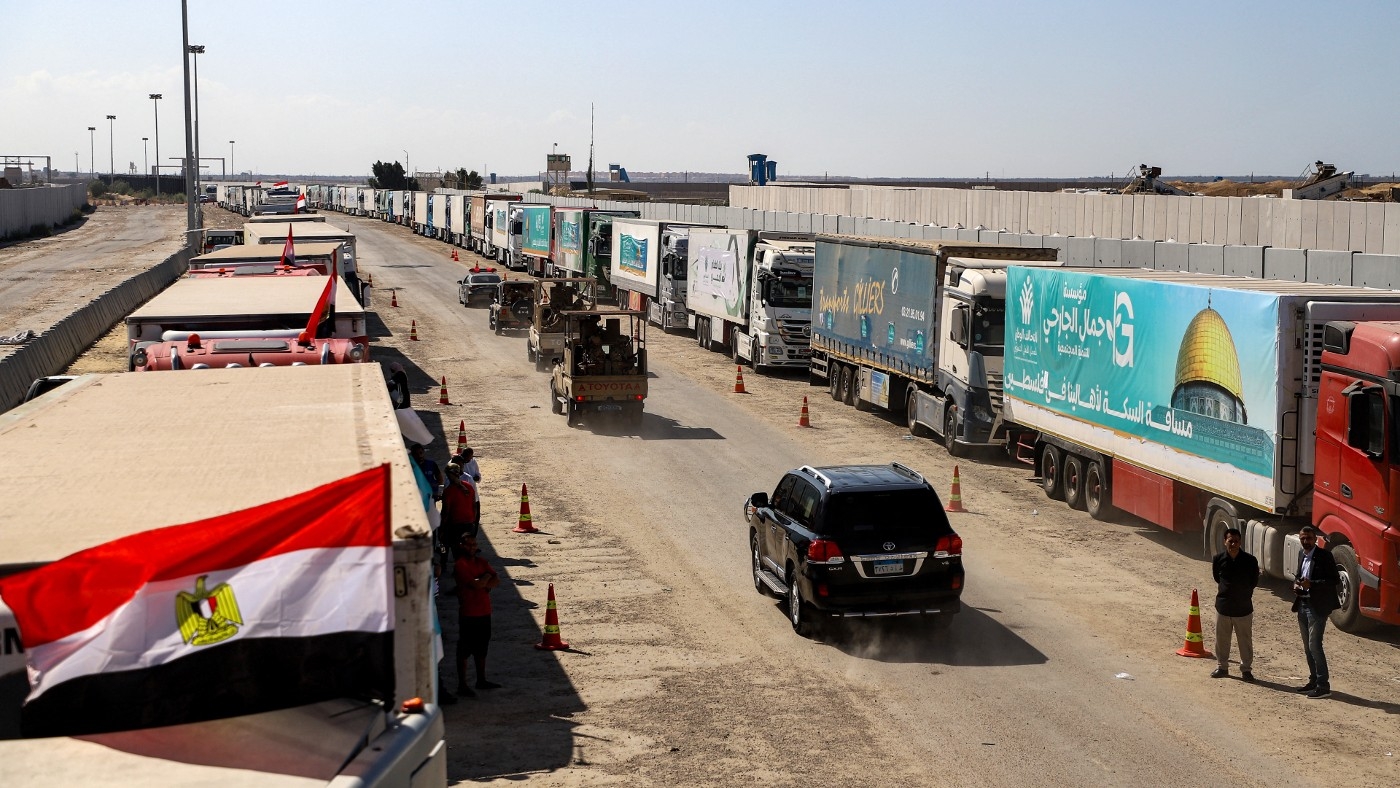
On the Egyptian side of Gaza’s Rafah border crossing, dozens of aid trucks are parked up, waiting to cross over into the Palestinian coastal enclave.
Truck drivers gather around a fire to keep warm, while Egyptian soldiers send one of their own off to buy groceries and snacks. Now and then, cheers and singing can be heard at the border crossing gate as Palestinians greet family members who have managed to flee Gaza.
Passing into Egypt from Gaza on New Year’s Eve alongside his two children, brother, and seriously injured wife, Mahmoud felt he could finally breathe a little more easily.
“We can still hear the sound of the air strikes and we still hide because of the fear,” the 39-year-old Palestinian, who was formerly a shopkeeper, told Middle East Eye.
Before making it across the border, Mahmoud lost seven members of his family to the ongoing Israel-Palestine war, including his father, stepmother, and two uncles.
New MEE newsletter: Jerusalem Dispatch
Sign up to get the latest insights and analysis on Israel-Palestine, alongside Turkey Unpacked and other MEE newsletters
To cross the Rafah border, he paid $15,000 to a “mediator” in Gaza. Neither he nor his wife has dual nationality, and neither was registered as severely injured, meaning they were not allowed to exit Gaza unless their names appeared on the daily lists of Palestinians permitted to pass over into Egypt.
“With the help of family members and relatives in Germany and Sweden, I was able to collect the money for myself and my family to get out,” Mahmoud told MEE.
As war continues to rage in the Gaza Strip, many Palestinians are desperate to get out to a place of greater safety. Rafah is now home to more than a million of the 1.9 million Palestinians displaced by the war (Gaza’s total population is 2.3 million), with civilians taking shelter in schools, factories and makeshift cloth tents.
With the border closed most of the time, only a limited number of Palestinians have been able to leave Gaza since 7 October, when the war began following the deadly Hamas-led attack on Israel. Some, however, have been able to find enough money to buy their way out.
This situation has opened the door for “mediators” to profit amidst the carnage. Right now, according to multiple sources, agreed fees range from $2,000 for children, to between $5,000 and $7,000 for adults. All deals are done in cash.
Security networks
Even before the war, these operators were known as well-connected people who had close relationships with either Hamas, Egyptian intelligence officials, or both, usually facilitating the exit of Palestinians looking to leave Gaza to study, emigrate, undertake the Hajj pilgrimage, or get specialised medical treatment.
As news of Palestinians paying to cross the border began to surface online, sparking anger, Diaa Rashwan, the head of Egypt’s State Information Service (SIS), hit out at “unfounded allegations circulating on social media and certain news outlets claiming that additional fees are being imposed on Palestinians at the Rafah border crossing, linking Gaza to Egypt".
'We met our mediator in Suez He told us that he works with Egyptian security'
- Besan, Palestinian refugee
However, MEE spoke to five different families – face-to-face and on the phone – who all confirmed that they had paid fees in the thousands, mostly in US dollars or Euros, to mediators who then facilitated their exit from Gaza.
While Mahmoud’s mediator was in Gaza, Besan’s family was in Egypt, in Suez.
The 41-year-old managed to cross the border with her injured husband in November. Through her connections, she paid $4,000 to allow her mother to cross over as well.
“We met our mediator in Suez,” she told MEE over the phone. “He told us that he works with Egyptian security and that he would pull strings to put our mother’s name on the list.”
After three weeks in a leaky tent with 60 other women, Besan’s mother was able to cross over into Egypt. “God knows what I had to do and what I had to sell to get this money, but it’s all worth it to collect our family – or what is left of our family,” Besan said.
MEE contacted the same mediator who helped Besan. After several calls, the man, who had a private number and identified himself as “Major Ali”, picked up.
He said he worked with an “executive apparatus”, adding that “prices are now up to $10,000 because the border is monitored”. He refused to disclose more information.
While Mahmoud’s family and Besan’s mother made it through, other Palestinians have fallen victim to scammers.
This is the fate that befell the al-Shamy family in December, when an Egyptian impersonating an officer collected 100,000 Egyptian pounds ($3,330) from them, promising to secure the passage of two of their cousins in return.
'Getting scammed by an Egyptian is a hundred times better than being bombed by an Israeli'
- Wael, refugee from Gaza
The family had come to Cairo in 2012, after the Syrian revolution, and had experience of being scammed when they were trying to leave their war-torn home country. With relatives in Gaza, they hoped to help facilitate a safe exit.
“The man disappeared with our money, and it turned out to be a scam. We tried to go to the police, but we were dismissed and threatened with being accused of publishing false news,” the family told MEE.
A security source working with the Egyptian military told MEE that mediation has been used by different sides controlling and overseeing the borders, referring to the Israeli, Palestinian, and Egyptian sides, to ease the lives of Gazan citizens, and to monitor any threats coming in or out.
The source denied that the military is directly involved but said that individual actors might be taking advantage of the situation.
However, a retired security source, who used to work with Egypt’s military intelligence in North Sinai, confirmed the existence of a network of mediators connected to different parts of the state’s security apparatus who were facilitating the entrance of foreigners from Egypt’s eastern borders.
MEE also spoke to two other families who confirmed that their mediators were Egyptian officials. Both families, one US dual nationals, and the other Canadian dual nationals, said they had paid around $10,000 for each family member to leave Gaza after they received no help from the US or Canadian embassies in Cairo.
The families said they were still waiting for their relatives, who are marooned in Gaza, to cross the border.
Eyes on Sinai
Mahmoud said he was detained by military intelligence and interrogated for 16 hours about his relationship with his cousin, who is a member of Hamas. He added that he received an invitation to work with the intelligence officers to identify “Hamas affiliates” and “jihadist elements”.
Egyptian military intelligence working in North and South Sinai have, since the 1973 Middle East war, often focused their work on Palestinians inside and outside of the peninsula.
In recent years, the security apparatus has been preoccupied with fighters affiliated with the Islamic State (IS) group. A handful of Palestinians have been captured or killed in action fighting alongside radical militants in Sinai.
The active security source told MEE that Egyptian officials are “very concerned” about the formation of smaller paramilitary groups aided by Hamas or Palestinian Islamic Jihad, which would then be used to attack Israel or cross its borders.
In addition to paying mediators, Palestinians passing the Rafah crossing are sometimes met with extortion or other scams.
Wael, a 54-year-old Palestinian, crossed the border with his family in December. They were then scammed into renting an apartment in Cairo’s Nasr City area, only to find out it was already occupied.
“The apartment was in a building that is owned by the Egyptian military, and therefore the administration chose other Egyptian tenants over us, even though we paid more,” Wael said.
The optimistic middle-aged man joked that “getting scammed by an Egyptian is a hundred times better than being bombed by an Israeli”, adding that despite everything, he “felt at home in Egypt”.
The family arrived in Cairo amidst a wave of anti-immigrant sentiment fuelled by pro-state supporters on social media, which blames the economic failures of President Abdel Fattah el-Sisi’s government on Syrian, Sudanese, and other African refugees.
This article is available in French on Middle East Eye French edition.
Middle East Eye delivers independent and unrivalled coverage and analysis of the Middle East, North Africa and beyond. To learn more about republishing this content and the associated fees, please fill out this form. More about MEE can be found here.


